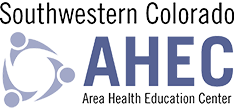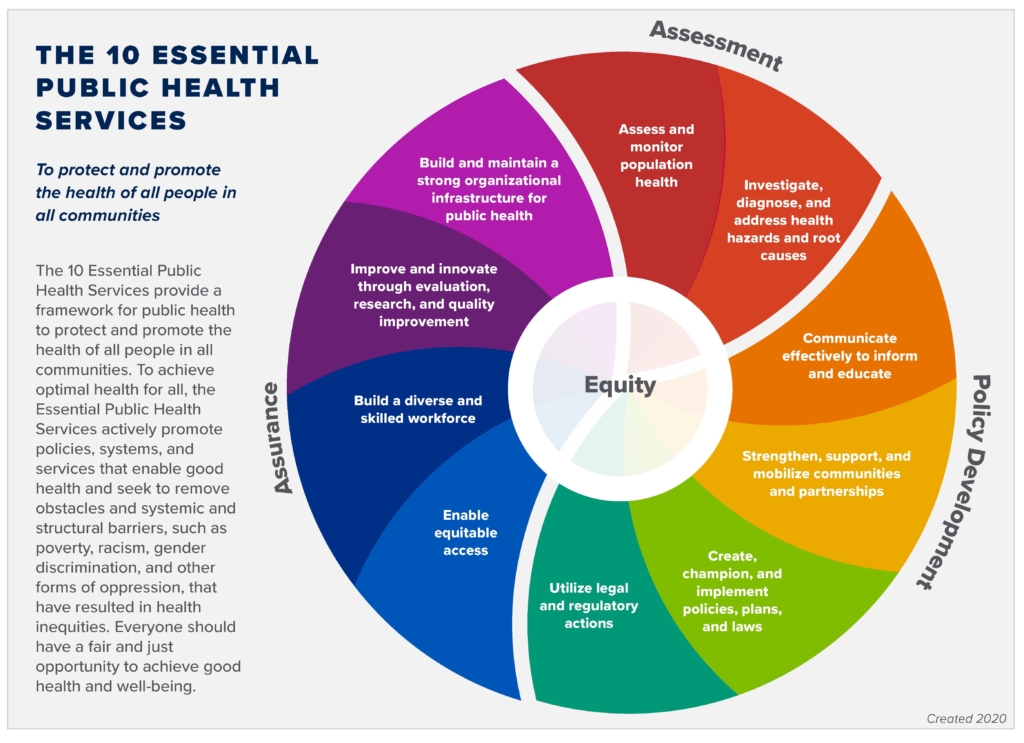Public Health Pathway
What is Public Health?
The science of preventing disease and promoting the general well-being of a population. Public health initiatives include a wide range of occupations that blend natural and social sciences to improve the health of a community.
Image courtesy of https://www.cdc.gov/publichealthgateway/publichealthservices/essentialhealthservices.html
Core Competencies for Public Health Professionals
Data Analytics and Assessment Skills
Policy Development and Program Planning Skills
Communication Skills
Health Equity Skills
Community Partnership Skills
Public Health Sciences Skills
Management and Finance Skills
Leadership and Systems Thinking Skills
Major Areas and Potential Job Opportunities
Biostatistics and Informatics
– Systems analyst, Biostatistician, Database Administrator- Communications
– Technical Medical Writer, Public Health Journalist, Public Health Information Officer Community Health
– Program Coordinator, Director of Family Health Services, Outreach SpecialistPublic Health Education
– Nurse Educator, Health Teacher, Academic Policy AdvisorEmergency Management
– Emergency Response Specialist, Disease Preparedness Researcher, Bioterrorism
ResearcherEnvironmental Health
– State/Federal Environmentalist, Public Health Engineer, Environmental Health
Technician,Global Health Careers
– HIV/AIDS Research Associate, International NGO Aid Worker, Global Infectious Disease
AnalystEpidemiology and Research
– Database Administrator, Vaccine Researcher, Disease Ecologist, EpidemiologistMental Health
– Health and Wellness Manager, Health Program Coordinator, Behavioral Research
ScientistPublic Policy and Administration
– Public Health Researcher, Healthcare Policy Analyst, Health Services ManagerSocial and Behavioral Science
– Evaluation Specialist, Intervention Researcher, Addiction Treatment Program Developer
Where can I work?
- Federal, state, and local public health agencies: Coordinate with public health departments to prevent and detect disease outbreaks and other public health threats across the country and within their own communities. State and local health departments enforce public health regulations in the United States and will work with
federal and global health agencies as needed. - Other government agencies: Other health agencies set public health policy and enforce public health laws and regulations at every level of government.
- Colleges and universities: Contribute to important research, education, and
policymaking contributions in public health. - Health care settings: Keep communities healthy through working in healthcare settings alongside local and state health departments in addition to caring for patients.
- Nonprofit agencies: Nonprofits can do everything from providing funding for public health research to offering individual care to patients.
- Private companies: Much like nonprofits, private companies wear many hats in the public health world and can do everything from providing funding to research and development.
Citation: Centers for Disease Control and Prevention. “See Yourself in a Public Health Career.”
U.S. Department of Health & Human Services. August 21, 2021.
LEARN MORE>>>
Public Health Videos
What is the difference between public health and medicine?
Public Health and Medicine have many differences.
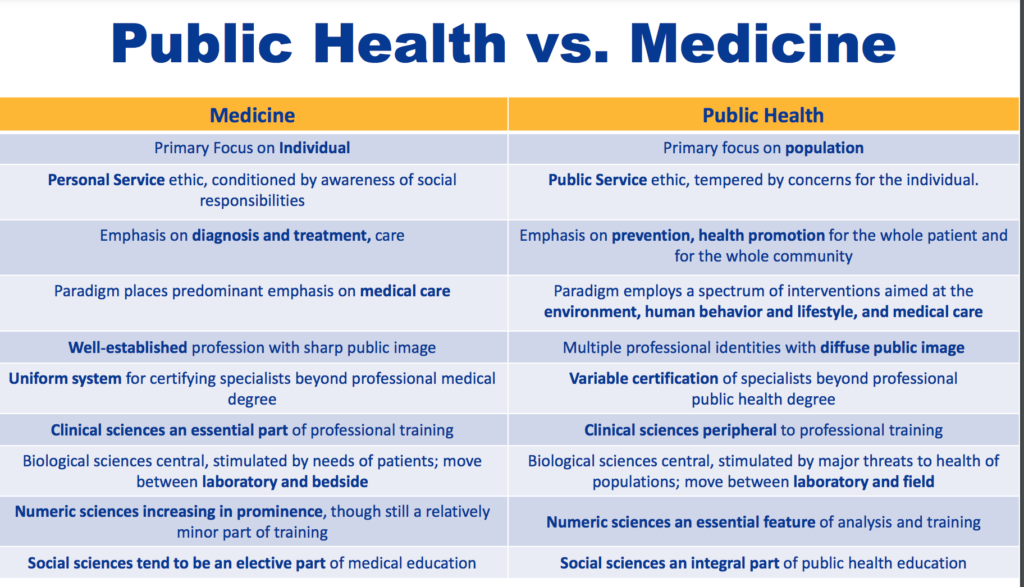
Image courtesy of https://publichealth.pitt.edu/discover
Yet as the recent COVID-19 public health emergency demonstrated,
Public Health and Medicine also share many characteristics.
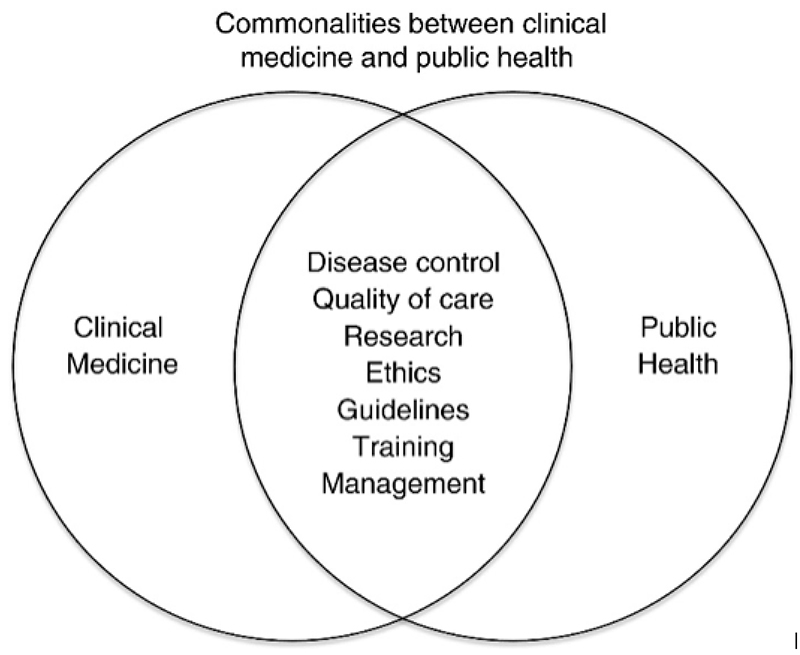
At SWCAHEC, we work to develop inter-professional relationships that both celebrate the unique skill and knowledge of health professionals and emphasize their commonalities. In this way we help to develop the clinical/community linkages that help address health disparities and increase wellness.
Clinical/Community Linkages help address the Social Determinants of Health. According to the CDC, the Social Determinants of Health are the “non-medical factors that influence health outcomes. They are the conditions in which people are born, grow, work, live and age. These forces include economic policies and systems, development agendas, social norms and policies, racism, climate change and political systems.
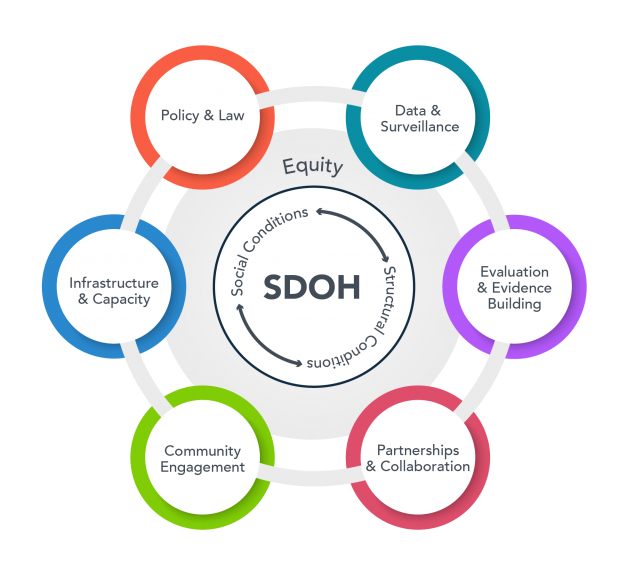
Image courtesy of https://www.cdc.gov/about/sdoh/index.html
Educational Pathways
In Southwestern Colorado, there are various ways to receive the degrees, skills and knowledge needed for a career in Public Health.
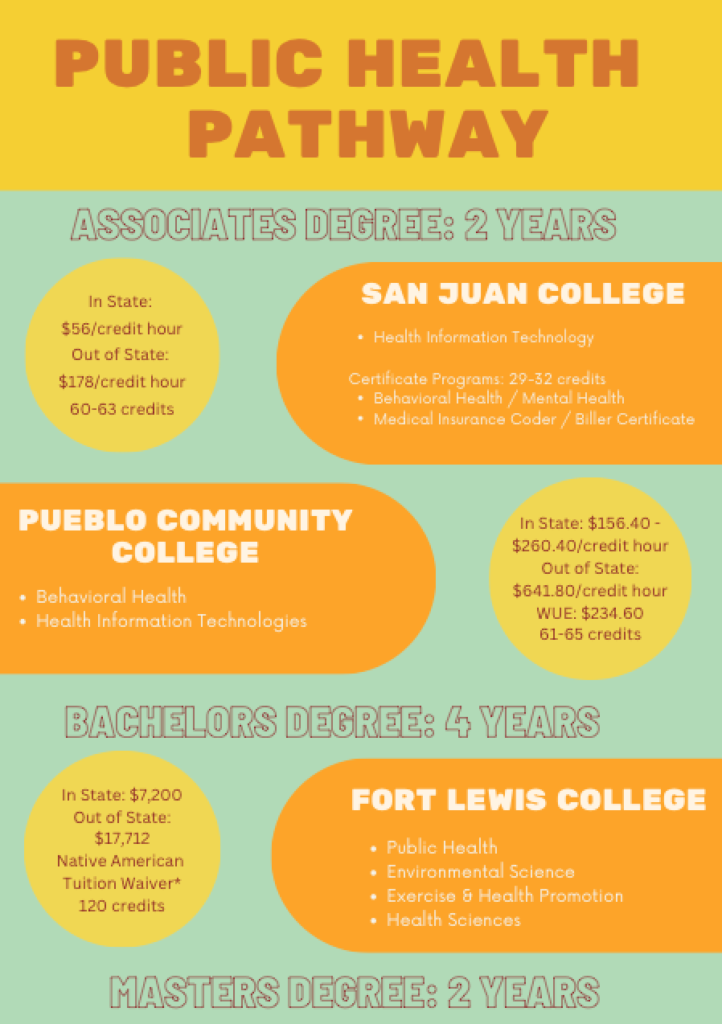
Community Health Worker Certificate
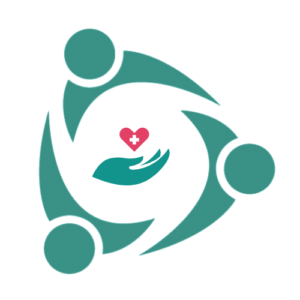
What is a CHW?
American Public Health Association Definition:
A Community Health Worker (CHW) is a frontline public health worker who is a trusted member of and/or has an unusually close understanding of the community served. This trusting relationship enables the CHW to serve as a liaison/link/intermediary between health/social services and the community to facilitate access to services and improve the quality and cultural competence of service delivery.
A CHW also builds individual and community capacity by increasing health knowledge and self- sufficiency through a range of activities such as outreach, community education, informal counseling, social support and advocacy.
Community Health Workers come from the communities they serve and they provide culturally and linguistically appropriate services that increase the wellness of community members.
CHWs provide:
- Outreach
- Home visits
- Health Education
- Client Centered Counseling
- Care Management
- Facilitation of Support Groups
- Culturally sensitive services
Community Health Worker Education:
CHW certificates and trainings focus on competencies that guide learning. These competencies list the skills and knowledge needed for success as a community health worker. SWCAHEC Community Health Worker Competencies can be found here: Link to PDF SWCAHEC has partnered with Fort Lewis College to develop a Community Health Worker Certificate. The certificate is part of the Public Health department and includes courses that address workforce competencies, including a Community Health Workers Fundamentals capstone course, and a practicum that allows for field experience in community health work.
FORT LEWIS COLLEGE
– Community Health Worker Certificate
For more information about the Community Health Worker Certificate at Fort Lewis College, click here.
